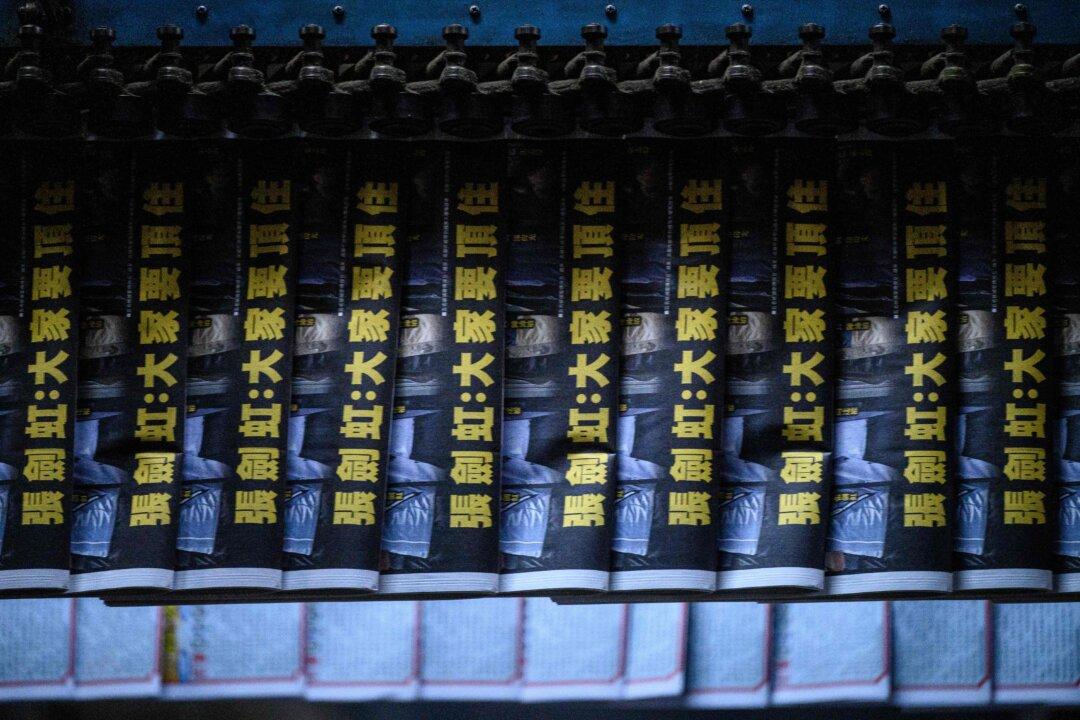Recently, many Falun Gong informational displays such as banners, flags, and boards have been defaced with paint or ink in Hong Kong. In one incident, passersby helped to stop a perpetrator and called the police.
Man Defaces Falun Gong Slogans Citing National Security Law
Ms. Shi is a Falun Gong practitioner who, after retiring, moved to Mong Kok district five years ago to help with activities exposing the Chinese regime’s brutal persecution of Falun Gong on Soy Street, a Hong Kong tourist site.On the morning of Aug. 21, Ms. Shi went to the site as usual. When she returned after a restroom break, she found the banners and flags smeared with black ink.
On the following day, as she was handing out newspapers containing news about the persecution of Falun Gong, a man sprayed ink onto the banners and then immediately ran away.
On Aug. 24, the same person sprayed the ink and again ran away. Ms. Shi ran after him and yelled, “Help me catch him.” Two young men rushed over and stopped the man, and called the police.
According to Ms. Shi, the man was wearing a cap and a mask. He looked to be in his 50s, slim and tanned, with disheveled hair and scruffy clothing.
The man threatened Ms. Shi, saying, “The national security law is enacted, yet you dare to show these [Falun Gong materials]? Okay, I also want the police to come ... wait for the police to come ... see who the police will arrest, you or me?”

Man Charged With Criminal Vandalism
When the police arrived, several male officers questioned the man and a female police officer asked Ms. Shi to describe the damage.Ms. Shi and another female Falun Gong adherent went to the Mong Kok Police Station to report the incidents. The police asked the women if they wanted to press charges or to let him go after he pays for the damages. Ms. Shi replied: “Of course we must charge him.” The police said that they would charge him with criminal vandalism.
The next day, more than a dozen people showed up at the Falun Gong site on Soy Street and cursed at the adherents there.
For several days, multiple activity sites of Falun Gong adherents in Hong Kong have reportedly been attacked by unknown individuals. The site on Argyle Street in Mong Kok was defaced by ink on many occasions, and Falun Gong practitioners had to protect the banners by wrapping them in plastic bags. The slogans displayed in Causeway Bay were torn down.
In an interview on The Epoch Times’ American Thought Leaders program, human rights activist and founder of UK-based nonprofit Hong Kong Watch Benedict Rogers said that the new security law imposed on Hong Kong by Beijing crushes the city’s freedom of belief.
U.S. Secretary of State Pompeo wrote on Twitter: “The CCP’s draconian national security law ends free Hong Kong and exposes the Party’s greatest fear: the free will and free thinking of its own people.”
Abstain From the CCP
Falun Gong has reportedly spread to more than 100 countries and regions in the world.The practice and its founder have received numerous awards, proposals, and letters of support from the international community.
On the occasion of World Falun Dafa Day on May 13 this year, Falun Gong practitioners received letters from more than 200 politicians in the United States, Canada, Germany, Australia, Hong Kong, Taiwan, and other places around the world congratulating Falun Gong on spreading to the world.
Ms. Shi said she felt sorry for those who hold pro-Beijing views. “The Communist Party does not represent China. The Communist Party has done so many bad things. Only by staying away from the CCP can we ensure peace.”
Ms. Shi is in her 70s and has practiced Falun Gong for 23 years. On the streets of Hong Kong at the Falun Gong information sites, she often explains to people how the practice helps to improve one’s mental and physical health and raises awareness about the CCP’s persecution campaign.
Ms. Shi said that many mainland Chinese immigrants have come to the Falun Gong sites to state that they withdrew from the CCP. According to the Chinese language Epoch Times website that records Chinese who withdraw from the CCP and its associated organizations, more than 360 million people have registered on the site and declared their withdrawal.
The movement to renounce, withdraw from, or quit the CCP, called “Tuidang” in Chinese, began in late 2004, soon after The Epoch Times published the “Nine Commentaries on the Communist Party,” an editorial series that explores the nature and history of the CCP.


